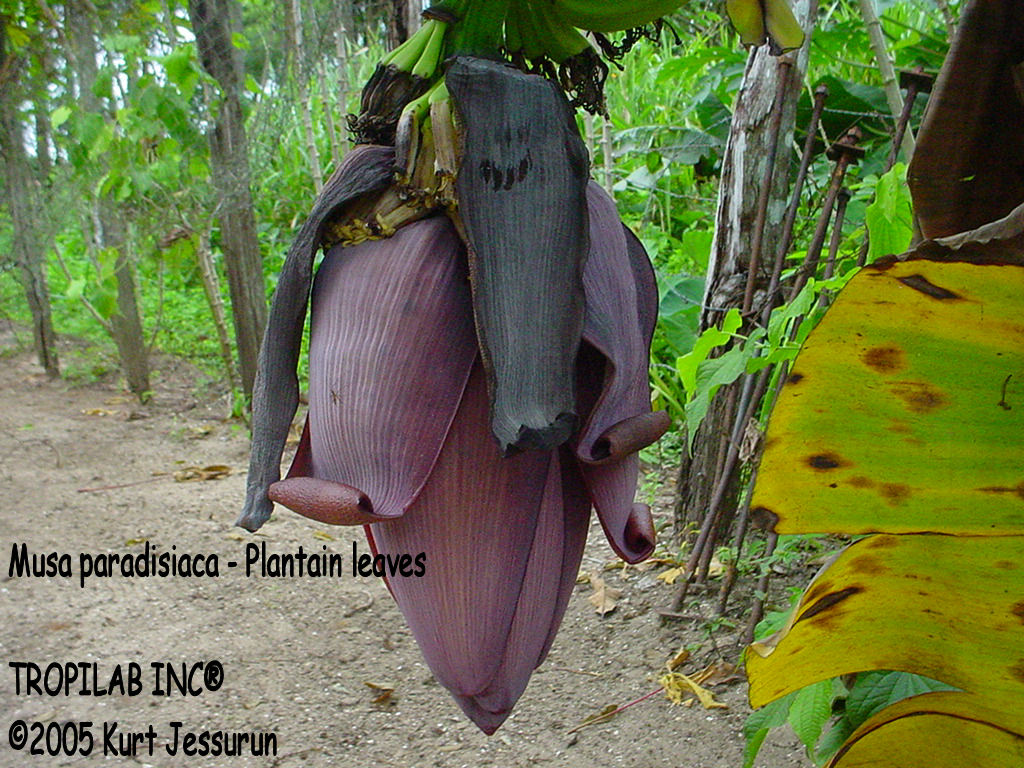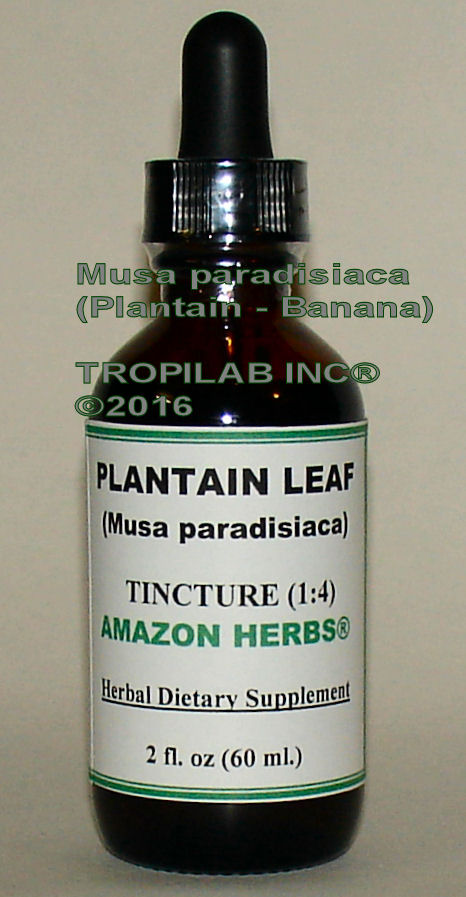 |
 |
| PLANTAIN LEAF TINCTURE (tinctura Musa paradisiaca) from AMAZON HERBS® |
 OVERVIEW
OVERVIEWPlantain leaf is a large, long-oval, tapering, purple-clad bud. As it opens, it is seen that the slim, nectar-rich, tubular, toothed, white flowers are clustered in whorled double rows along the floral stalk, each cluster covered by a thick, waxy, hood-like bract. It is purple outside and deep-red within. The purple/red protecting leaves (bracts) of the bud are traditionally used against heavy menstrual bleeding (menorrhagia). All parts of the banana plant have medicinal applications. Other therapeutic uses are against diarrhea, dysentery, migraine, hypertension, asthma and jaundice. It is effective against gastritis, peptic ulcers, diarrhea, dysentery, cold, and cough. CONSTITUENTS Tannins, eugenol, tyramine, Serotonin, levarterenol, leucocyanidin (flavonoid) and dopamine are available in the ripe fruit and peel. Other chemical constituents are alkaloids, steroidal lactones, and iron. PHARMACOLOGY  The possible activity of Musa paradisiaca L. (Musaceae) against the toxicity of snake
venoms was studied. Musa paradisiaca, an important source of food in the world, has also been reported to be
popularly used as anti-venom. Interaction of Musa paradisiaca extract (MsE) with snake venom proteins has been
examined in this study.
The possible activity of Musa paradisiaca L. (Musaceae) against the toxicity of snake
venoms was studied. Musa paradisiaca, an important source of food in the world, has also been reported to be
popularly used as anti-venom. Interaction of Musa paradisiaca extract (MsE) with snake venom proteins has been
examined in this study.Phospholipase A2 (PLA2), myotoxic and hemorrhagic activities, including lethality in mice, induced by crotalidae venoms were significantly inhibited when different amounts of MsE were mixed with these venoms before assays. On the other hand, mice that received MsE and venoms without previous mixture or by separated routes were not protected against venom toxicity. Partial chemical characterization of MsE showed the presence of polyphenols and tannins and they are known to non-specifically inactivate proteins. It is suggested that these compounds can be responsible for the in vitro inhibition of the toxic effects of snake venoms. In conclusion, according to the results, using mice as experimental model, MsE does not show protection against the toxic effects of snake venoms in vivo, but if was very effective when the experiments were done in vitro. DOSAGE Tincture: 1 - 3 ml (1 - 3 full droppers daily) For more information on Plantain, go to the "MEDICINE FROM NATURE" page. REFERENCE 1. Musa x paradisiaca Linnaeus, and Musa acuminata Lolla. Available at http://instruct1.cit.cornell.edu/courses/hort400/mpts/musa.html. Accessed May 4, 2005. 2. Musa. Bontany.com website. Available at http://www.botany.com/musa.html. Accessed May 4, 2005. 3. Morton J. Atlas of medicinal plants of Middle-America: Bahamas to Yucatan: Musaceae. Illinois: Charles Thomas;101,170. 4. Grieve M. Plantain Fruit. Botanical web site. 1996. Available at: http://www.botanical.com/botanical/mgmh/p/plafru51.html. Accessed April 22, 2005. 5. Ojewole J, Adewunmi C. Hypoglycemic effect of methanolic extract of Musa paradisiaca L (Musaceae) green fruits in normal and diabetic mice. Methods and Findings in Experimental and Clinical Pharmacology 2003;25(6):453-6. 6. Lewis D, Field W, Shaw G. A natural flavonoid present in unripe plantain banana pulp (Musa sapientum L. var. paradisiaca L) protects the gastric mucosa from aspirin-induced erosion. Journal of Ethnopharmacology 1999;65(3):283-8. 7. Orie N. Direct vascular effects of plantain extract in rats. Experimental Physiology 1997;82(3):501-6. 8. Goel K, Govinda D, Sanyal K. In vivo antimicrobial activity of Mosa paradisiaca L root extracts. Fitoterapia 1989;60(2):157-8. 9. ASPCA Poison Control Center. Toxic and Non-Toxic Plant. Animal Hot Spot website. 2004. Avalable at http://www.people.ku.edu/~peace03/toxicplants.htm. Accessed May 4, 2005. 10. Guevara O, Rodriguez T, Perez C, et al. Oral acute toxicity assay of a phytomedicine elaborated with an extract of Musa Paradisiaca pseudo-stem. Acta Farmaceutica Bonaerense 2003;22(1):57-9. 11. Nwafor S, Esimone C, Amadi C, et al. In vivo interaction between ciprofloxacin hydrochloride and the pulp of unripe platain (Musa pradisiacaL). Eur Journal of Drug Metabolism & Pharmarcol. 2003;28(4):253-258. 12. Reid HA. Diagnosis, prognosis, and treatment of sea-snake bite. Lancet. 1961 Aug 19;2:399-402. The above presentation is for informational and educational purposes only. It is based on scientific studies (human, animal, or in vitro), clinical experience, or traditional usage. For many of the conditions discussed, treatment with prescribed (RX) or over - the - counter (OTC) medication is also available. Consult your doctor, practitioner, and/or pharmacist for any health problem and before using dietary supplements or before making any changes in prescribed medications. |
|
For the right freight rate, please visit our Webstore page! |
|
TROPILAB® INC copyright disclaimer |